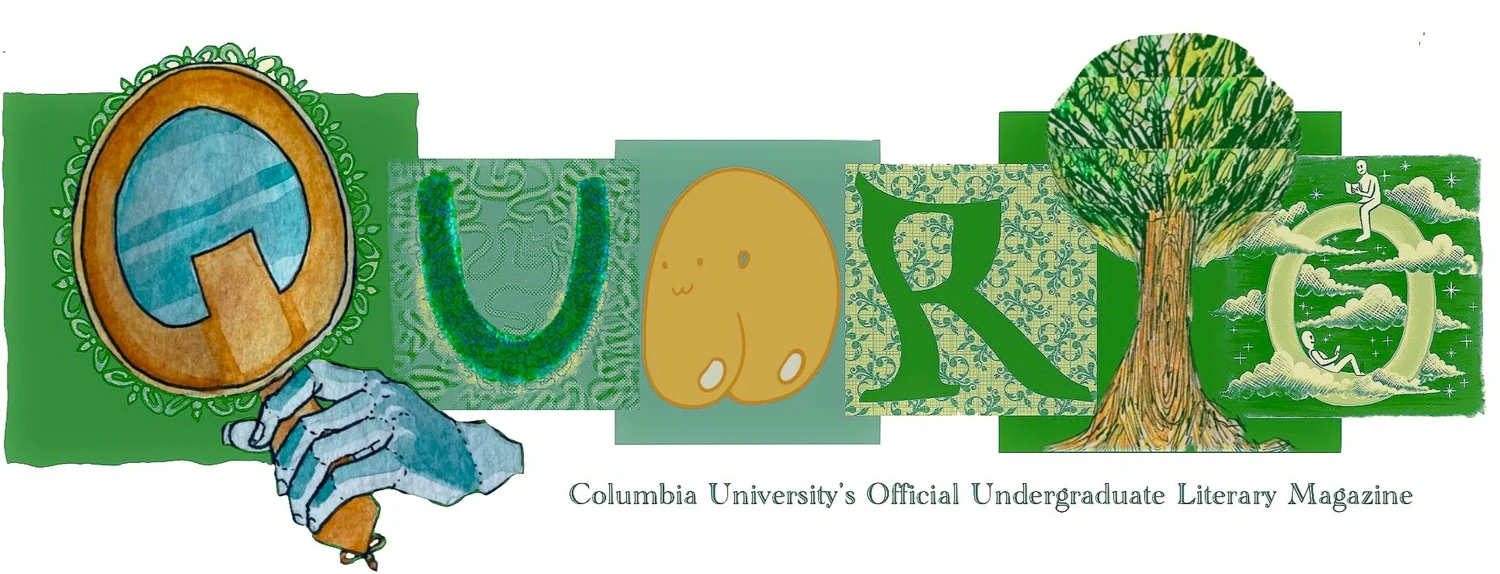This piece was first published in Quarto’s 2021 Spring Print Edition.
Trigger warning for problematic sexual ideation.
They were about to explode, though they didn’t know it. They were sitting there – well,
he was sitting and she was standing – as if nothing was afoot. But indeed, their fates were sealed,
the mines rooted firmly in the earth beneath the chipping tiles of their kitchen floor.
“Did you happen to get mangoes earlier?” she asked.
“Think so,” said he.
“Well, where are they? I can’t find them. You know, I’ve really gotten a taste for them
recently. It’s like when I was pregnant, except then it was tteokbokki. You remember. When I
was pregnant, nothing could be spicy enough!”
The fact was, at the supermarket he’d seen the check-out girl’s breasts, or, really, only
that soft line between them he had always found to be more than enough, as she bent over to bag
his things, and he’d neglected to take the mangoes he’d bought with him as he hurried out. He
had been in a rush to bring his shopping cart back to the base of his torso, struggling to hide the
erection rising below, and so he had left the two mangoes tangled in their plastic sheets at the
end of the cashier’s conveyor belt as he pulled the cart into himself with both hands, leaning
forward and pushing it out of the building. The mangoes were the only items he’d forgotten. The
check-out girl was a blonde.
“You didn’t get any tteokbokki, did you?” she asked.
“Mm... no,” he said, readjusting himself in his chair. “They don’t sell that.” She looked
at him from the entryway into the kitchen, but he, in the living room, was watching TV.
“I made soondubu for dinner,” she said. “We could have a mango for dessert – where did
you say they were?”
He didn’t answer her. He looked into the light of the television, but registered none of
what he saw. He was angry with her now, in his quiet way; she had made him think of their
daughter, a subject he preferred not to consider, if he could avoid it. It had been easier for him to
do this, avoid, the past few years, but lately his wife had been bringing the girl up almost
incessantly. It was as if she were yanking a rope, convinced that with the next yank, their
daughter would come tumbling in from the recesses of their mind and onto the carpet of their
living room. That’s how he pictured it. As if the child was tethered to some kind of leash. On the
other hand, his wife had no such idea; she just couldn’t stop thinking about the girl these past
few weeks, and she didn’t know why.
“Where are the mangoes?”
He had really loved her when they were much younger, but never since as honestly or as
well. When they’d gotten here, she’d noticed his eyes wander, marveling at all the different kinds
of women there were, the different shapes and colors of them. She didn’t blame him for it and
never held it against him, and as far as she could ever tell – and she would have been able to tell
– he had never acted on these fleeting attractions. In truth, he might have, but he was a nervous
and pretty ugly man, largely unaware of how few women in the world would have done what she
had done, gone where she had gone, alongside him.
“What show is this?” he said, finally.
She scrutinized the screen for a moment, sliding her glasses up her nose. “Ca-lif-orn-i-
cation.” Then she looked back down at her husband, her hands swinging limply into her thighs.
“Are you listening to me?”
He had been, but was then lost in a private thought. That was happening a lot lately, too.
The women he’d admired in passing over the years, the grocery girl now included, all lived
there, in this oasis he retreated to, a state where it never rained. Things were easier there. People
were always happy to see him, and if anyone disappeared, he could get them to come back if he
wanted to. But the private thought he had then was nothing secret, it could have been said aloud
– he was only wondering when the two of them had started speaking English to each other so
much. There was no way to be sure.
“No mangoes, then,” she said, turning back into the kitchen.
“They sell steak at the supermarket,” he replied. “We never have steak.”
Once, at the beginning of their courtship, he had surprised her with a red balloon blown
in the shape of a horse. A man at the mall in his neighborhood had been selling them for five
hundred won. He’d watched the man construct the horse, spellbound by the swiftness of his
dirty, agile fingers. She, for the rest of her life, remembered lying in bed, tossing it up above her
and watching its slow descent back toward her face, until the morning she rolled onto her side
and was awakened by the sound of it popping under her weight.
“Well, buy some then.” She raised her voice a little, standing now at the kitchen counter.
But he wouldn’t. They had eight seconds.
Owen Park (he/him) is a senior at Columbia College studying creative writing.

